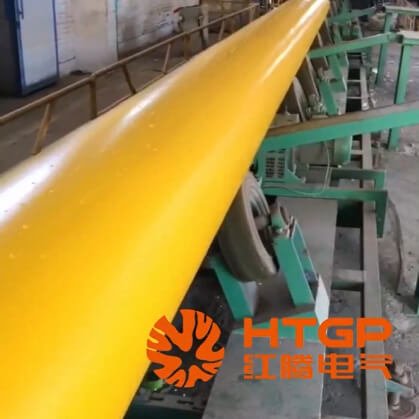Steel pipe anti-corrosion is a series of measures taken to prevent steel pipes from being corroded during use.
Email:[email protected]
Wechat/Whatsapp:008617538889778
Tel:+86-17538889778

3PE Insulation Pipe Production Line 5 If steel pipes are not treated with anti-corrosion, they are prone to corrosion. Corrosion will make the wall thickness of steel pipes thinner, reduce their strength and bearing capacity, and may cause problems such as rupture and leakage during use of steel pipes, affecting their normal use functions. For example, in pipelines that transport media such as oil and gas, once the steel pipe is corroded and perforated, it will not only cause medium leakage, but also may cause safety accidents and environmental pollution.
Steel pipe anti-corrosion is a technology or process designed to prevent or slow down the chemical or electrochemical reactions caused by environmental factors and the influence of the conveying medium during the use and transportation of steel pipes, which leads to corrosion. This technology is of great significance for extending the service life of steel pipes, reducing operating costs and ensuring the safety of conveying media.
Overview of steel pipe anti-corrosion Definition: Steel pipe anti-corrosion is the process of surface treatment or coating of steel pipes by specific methods or materials to enhance their corrosion resistance.
Importance: Since steel pipes are widely used in many fields such as petroleum, chemical industry, electricity, water conservancy and urban construction, and are often in harsh environments, anti-corrosion treatment is essential to ensure the safe operation of steel pipes.
Methods of steel pipe anti-corrosion There are many methods for steel pipe anti-corrosion, mainly including the following:
- Coating anti-corrosion: Coating one or more layers of anti-corrosion coatings on the surface of steel pipes, such as epoxy anti-corrosion coatings, polyethylene resin anti-corrosion coatings and rubber anti-corrosion coatings. These coatings can form a protective film to isolate the steel pipe from contact with the corrosive medium, thereby achieving an anti-corrosion effect. – Epoxy anticorrosion coating: composed of epoxy resin and curing agent, with excellent adhesion, chemical corrosion resistance and mechanical properties.
– Polyethylene resin anticorrosion coating: made of monomers, with strong sealing, high mechanical strength and good waterproofness. – Rubber anticorrosion coating: using natural or synthetic rubber that has been chemically treated or mechanically processed, combined with solvents, fillers, pigments and catalysts, it has good elasticity and corrosion resistance.
Lining anticorrosion: through a unique embedded lining process, corrosion-resistant materials such as filament winding composite materials or extruded thermoplastics are formed inside the steel pipe. This material can effectively isolate corrosive liquids and gases and provide internal protection for the steel pipe.
Electrochemical anticorrosion: using electrochemical principles, by changing the potential on the surface of the steel pipe or forming a dense oxide film, to prevent or slow down the occurrence of corrosion. Cathodic protection technology is a common electrochemical anticorrosion method.
Other methods: including thermal spraying, hot-dip galvanizing and galvanizing, which improve the corrosion resistance of steel pipes by forming a metal or non-metal protective layer on the surface of the steel pipe.
Application of steel pipe anti-corrosion
Steel pipe anti-corrosion technology is widely used in many fields such as petroleum, chemical industry, electric power, water conservancy and urban construction. In the petroleum industry, anti-corrosion steel pipes are used to transport corrosive media such as crude oil and natural gas; in the chemical industry, anti-corrosion steel pipes are used to transport various chemical raw materials and products; in the power industry, anti-corrosion steel pipes are used for cable protection casings and transmission line towers; in the fields of water conservancy and urban construction, anti-corrosion steel pipes are used for water supply and drainage pipelines and bridge structures.
Conclusion Steel pipe anti-corrosion is an important technology or process, which is of great significance to ensure the safe operation of steel pipes and extend their service life. With the continuous advancement of science and technology and the continuous development of anti-corrosion materials, steel pipe anti-corrosion technology will continue to be improved and upgraded.